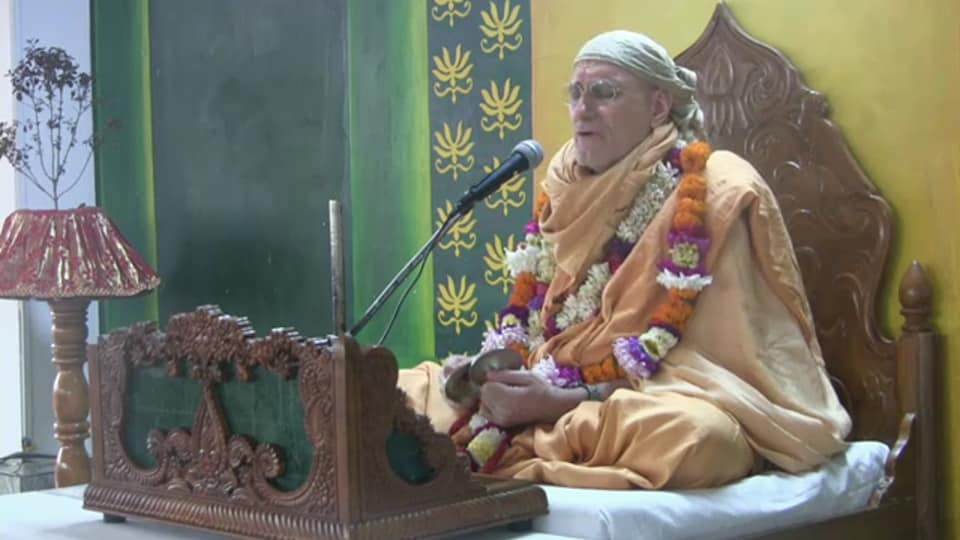
Reading from Manu Saṁhitā (2.218): 'As the man who digs with a spade (into the ground) obtains water, even so an obedient (pupil) obtains the knowledge which lies (hidden) in his teacher.
HH Bhaktividyā Pūrṇa Svāmī Mahārāja: So, it is through obedience, by taking the instructions, by following them, that's how one will actually gain knowledge. Means, this is the end of that whole section on respect, knowledge, study. So through this, that's how you get knowledge, is by obedience, service, then there will be, one will gain that kind of knowledge. So hidden. So there is obvious. But then, what's the meanings behind it, everything like this... Because it is not that the teacher has to teach it, the student has to be interested. As we saw before, knowledge said, 'Don't give me to someone who is not qualified, who is not interested.' So skills you might give, but we see. is that giving these specific knowledge or specific skills, then that's the duty of the upadyāya. Right? But the ācārya means that you are giving how to apply those, and then the hidden meanings behind that, that is more important. So that can be obtained by someone who is obedient.
Otherwise, they can do their duties, but there is the attitude, then they may not get. Like let's say, Gautama's son. We told the story, no? Like Gautama's son, he had gone to the Gurukula and had grown up, and so then... I think it is Gautama. But in any case, one of the great sages, his son. He went to the gurukula and he was very intelligent. And then when he graduated as a snātaka, then they were traveling around a bit, going to different programs and that. So the kings have these big yajñas, and they would go to them. Because a brāhmana as a snātaka, it's between when he graduates and when he gets married, then he has that time, he can travel a bit and pick up knowledge or experiences that he wouldn't have gotten in the school and maybe difficult to get after he is married. So they were traveling and went to the court of one king, and there was discussions about different subject matters. So when he arrived with whoever else he was with, then the king, understanding who he was, but he thought, 'Well, his father is such a great scholar, and so then he also must be similar.' So then he asked him about the soul and about transcendence, and the kid didn't know about it. You know, he knew the Vedas, he knew the rituals, he knew the technicalities of it, he knew all those kind-of like very technical details, he didn't know about spiritual knowledge. So he became offended. you know, it's like, 'You are talking about something that doesn't exist.' Because he went to the school, he has never heard of it.
So he went home afterwards, and then his father was asking how was this, probably he was sitting with a few other sages, and they asked, 'Well, how was this yajña?' And he says, 'Oh, this king is very impious, he is insulting to the brāhmanas,' and all that, and the sages were thinking, 'No, but he is renowned for being very advanced in knowledge and behavior.' So they said, 'Well, what was he doing?' 'Oh, he was asking on these, we were there and he is asking, wasting our time and asking all kinds of questions that don't have any meaning.' They said, 'Well, what were those questions?' So when he repeated what the questions were, then Gautama and the other sages could understand that these are questions you would ask if you were advanced in spiritual knowledge and trying to go deeper, and the questions he was asking were already more advanced than what they knew. So they all decided, 'Let's go visit the king.' So then they all went and collected firewood and went to visit the king. Because that's one of the things, when one comes, the element of submission here of becoming a student is one comes with firewood for tending the yajña, because that means, you are willing to do service.
You just want knowledge, okay, but what are you going to do? So here that you come with wood, you are already ready. So they came to the king, and he was asking what he can do, because these are great personalities, and they said, 'We want to learn from you.' He said, 'Why?' and then they explained and that, and he says, 'You can stay here and be my guests, and whatever I know I'll teach you, but I won't be your teacher. I will just explain what I know. You will be my guests, and we can discuss,' like that because he was a king and they were great brāhmanas.
So like that, the point is is that knowledge which lies hidden - it is only through obedience. Otherwise, one can get a lot of knowledge, but one doesn't necessarily get what is hidden, unless one is obedient, right? And here it means, in Kṛṣṇa consciousness. Now, it may be, you can get so many things, but the point is is, if you really get, it depends upon Kṛṣṇa because it's Kṛṣṇa who gives the blessings that we understand Kṛṣṇa consciousness. If we please Him through our service attitude, then it works.
